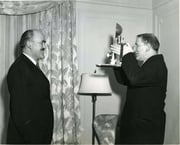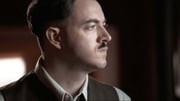RTÉ presents two, new and complementary History documentaries, from two sides of the modern political divide. A documentary on Eoin O’Duffy aired December 5th. Both O’Duffy and Frank Aiken hail from the border counties and formed their political personalities against the backdrop of the War of Independence before going on to play significant roles in the founding of the new state.
A founding member of Fianna Fáil, Aiken became Eamon de Valera’s closest confidante and a respected figure at the United Nations.
But as a young IRA commander in South Armagh, Aiken had been responsible for a campaign of sectarian murders that shocked even his hardened colleagues.
For decades, evidence of Aiken’s responsibility for the killings has been buried in Irish military archives. Now, it has been released. Eye-witness accounts from Aiken’s own men help us to uncover the hidden history of one of Ireland’s founding fathers.
Drawing on newly released official records and private papers, and featuring contributions from Frank Aiken’s sons, this documentary is based on primary research, as no biography of Aiken has yet been written.
Frank Aiken’s lengthy career as a revolutionary turned politician sheds light on many key episodes in twentieth century Irish history.
He played a crucial role in the IRA’s war in Ulster in the early ‘20s, a bitter and often sectarian struggle that is today almost forgotten.
On the 17th June 1922, a party of IRA men left Aiken’s Headquarters in Dundalk and headed for the small townland of Altnaveigh, just outside Newry. In the early hours of the morning, they rounded up the Protestant inhabitants and began a killing spree that lasted over an hour. Six civilians were shot dead, including an elderly woman.
“Neither youth nor age was spared, and some of the killings took place in the presence of their families,” recalled Patrick Casey, deputy commander of the IRA’s Newry Brigade, in a statement given to Irish military authorities.
Recently released – and reconstructed in the documentary – the testimony of Casey and others shows that the attack at Altnaveigh was sanctioned by Aiken himself.
“Nothing could justify such a killing of unarmed people and I was surprised at the time that Frank Aiken had planned and authorised this”, Casey wrote.
New evidence unearthed in the documentary also places Aiken just a few miles from Altnaveigh on the night of the attack, and helps to explain his motive. A few days before, a friend’s wife had been sexually assaulted by loyalist ‘B Specials’.
“I swore that if I could take it out of the skins of the men who did it I would do it”, Aiken revealed in 1929. He personally led a diversionary ambush of a patrol of Specials near Altnaveigh on the night of the killings: “We shot a few of them. I am sorry we did not get them all”.
In the documentary, Frank Aiken’s two sons speak candidly for the first time on camera about their father’s involvement in sectarian reprisals.
“We were conscious even as young people, that people had died and probably at his hand” recalls eldest son Frank Jr. “He always said to us that dreadful things happen in war and worse things happen in civil war.”
Aiken rose to become the IRA’s Chief of Staff in the dying days of the Civil War. He issued the ‘Dump Arms’ order that ended the conflict. Crucially, his decision to recognise De Valera’s authority as leader of the Republican Movement made possible the creation of Fianna Fáil.
Dev rewarded Aiken with a series of high-profile Ministerial appointments, including control of the massive censorship operation put in place during the Emergency. Aiken’s definition of what should be censored grew to include obituary notices and milk supplies. His uncompromising views on state security also led to him to approve the execution of several former IRA comrades in the ‘40s.
When Sean Lemass was promoted ahead of him as Tanaiste in 1945, Aiken seemed set to be remembered as a loyal, dour and uninspiring Minister. When Ireland gained membership of the United Nations in 1955 he was shunted off to New York– where Aiken’s reputation was transformed. He had begun life a revolutionary; at the UN Frank Aiken seemed determined to show he still was.
He infuriated both the US and the Catholic Church by insisting that Communist China’s representative be heard. He implored the newly-independent African and Asian states to avoid Ireland’s descent into civil war. He was given the honour of being the first signatory of the Nuclear Non-Proliferation Treaty in 1967.
“I don’t think any representative of a small country ever had as much influence in the UN as Frank Aiken came to have. He was greatly respected” – Conor Cruise O’Brien
“Aiken moved, remember, from being an IRA guerrilla leader to being a virtual pacifist in his later years. That’s quite a journey”
– Professor Joe Lee, New York University.

